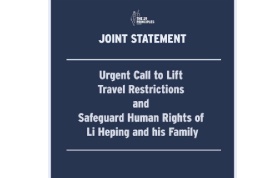“Li Heping’s wife and 13-year-old daughter, who were traveling with Li, also faced travel restrictions and were unable to leave the country. This not only affects their personal freedom but disrupts their education.”
We are deeply concerned about the recent interception of Chinese human rights lawyer Li Heping and his family, who were prevented from leaving the country by border police at Chengdu’s Tianfu International Airport on June 9th.
Read our Joint Statement:https://t.co/6Eue1S8UYW
— The 29 Principles (@the29principles) June 21, 2023
They were subjected to travel restrictions on the grounds that their departure might endanger national security. These restrictions amount to a violation of their right to freedom of movement and raise questions about the legality of such measures.
Li Heping started his human rights work as a lawyer in 2002. He has represented many politically sensitive cases including religious leaders, environmental and community activists as well as campaigned against the use of torture. Li Heping was arrested as part of the ‘709 crackdown’ on 10 July 2015. He spent nearly 22 months in pre-trial detention, including ‘residential surveillance in a designated location’ after which he was convicted in a secret trial to three years imprisonment and a four-year probationary suspension. Mr Li was released from prison on 10 May 2017. Since his release, Mr Li and his family have remained subject to close control and surveillance by state authorities.
We are deeply concerned that Li Heping’s wife and 13-year-old daughter, who were traveling with , also faced travel restrictions and were unable to leave the country. This not only affects their personal freedom but disrupts their education. Li Heping’s 23-year-old son has also experienced delays in his studies as a result.
Update #6 on the #ForcedEviction of lawyer #WangQuanzhang & @709liwenzu: Govt-hired thugs again cut off electricity and locked the switch box this afternoon Beijing time. The thugs now stationed downstairs outside the apartment building. https://t.co/p4YXCO0pj1
— Yaxue Cao (@YaxueCao) June 20, 2023
International human rights law protects the right to freedom of movement. The Universal Declaration of Human Rights (UDHR), Article 13, grants that “everyone has the right to leave any country, including his own, and to return to his country.” The International Covenant on Civil and Political Rights (ICCPR), Article 12, similarly establishes that “everyone shall be free to leave any country, including his own.” The Convention on the Rights of the Child (CRC), Article 10, entreats states to “respect the right of the child and his or her parents to leave any country.” Although China did not ratify the ICCPR, it has signed ICCPR and ratified the CRC, thereby assuming legal responsibilities under international law to protect freedom of movement and it must not act against the purpose of the ICCPR. International human rights norms provide clear guidance relating to China’s obligation to safeguard freedom of movement.
[…]
https://www.rfa.org/english/news/china/china-dissidents-harassed-06142023161406.html
https://www.rfa.org/english/news/china/lawyer-harassment-06202023143156.html




